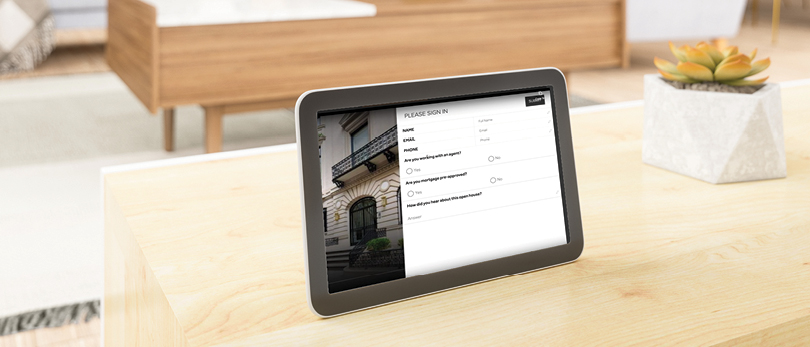Agents can employ innovative technologies to provide prospective buyers with an enhanced open house experience
By Michelle Huffman
Imagine this: You and your buyers walk into an open house, sign in digitally and instantly receive emails with packets of detailed information about the property.
You see digital displays with a video about the neighborhood and your clients scroll through pictures of the house, virtually staged in various styles. Though you’ve already seen a 3D or virtual reality (VR) tour of the home, you still have questions for the agent—or Alexa, which answers your questions about mechanics or room size as you stroll through the home.
After you leave, your clients want to take one more look at the master bath, so the listing agent connects with the clients via FaceTime from the room. Later, you automatically receive follow-up emails and texts about the status of the property.

This is the open house of the near future, designed to use technology to maximize the buyer experience before, during and after the event and encourage buyers to make higher offers, faster.
Open house tech gets an upgrade
Across the country, more agents are utilizing open houses, thanks to the inclusion of open house marketing on the MLS, which then pushes that information out to sites like Zillow, Trulia and Redfin. Buyers who start their search online can find open houses to their hearts’ content—but these same buyers expect a tech-friendly open house experience. Tech-friendly open houses benefit agents, too, bringing them more and better data about potential buyers.
“A lot of our success has been driven by embracing new technology,” says Michael Repka, CRS, and CEO of Deleon Realty in Palo Alto, California, where the price points of his listings justify his investment in lavish, unique open houses and the accompanying tools to pull them off.
Following are some technology upgrades to enhance your open houses.
Digital sign-in sheet
One of the most popular open house upgrades is a digital sign-in sheet that integrates with your CRM. This eliminates errors born of illegible handwriting, allows for personalized sign-in questions, and reduces the manual work of organizing and following up with these contacts. Open house pros can often automate some marketing and post-event touchpoints, including posting to social media, emailing visitors detailed information, soliciting feedback and sharing status changes, directly through the program.
Sample Solutions:
• Spacio
• Open Home Pro
• HomePass
• Open House Wizard
Video marketing
Video is a powerful promotional tool: Some agents carry out full open houses through Facebook Live. Others are chunking up their tours into bite-size pieces for Instagram stories.
Pat Monahan, CRS, with West USA Realty in Mesa, Arizona, posts a Facebook Live teaser video of a home’s best features to market the open house, and then another to kick off the open house. Produced videos are also popular, especially when they are unique—like Repka’s house tours in which he dresses up in the clothes of the period when the house was built or meets a mermaid poolside.
Sample Solutions:
• Videolicious
• Animoto
3D & virtual tours
3D home tours, which offer the best sense of a home’s layout, flow and details without the intrusion of photo editing, have exploded in popularity, particularly as the spread of COVID-19 effectively shut down open houses, and it’s likely their popularity will remain after the virus’ impact diminishes.
Addie Owens, CRS, and CEO of Touchstone Real Estate in Central Florida, and her team own two 3D cameras, a Matterport and a Ricoh Theta V (both pay for themselves, but the Theta V offers excellent quality for 1/10th of the Matterport price, Owens says). Using these cameras, her team creates the 3D tour and narrates a walkthrough of it on a listing’s microsite.
VR is on track to become a nearly $30 billion industry this year, and its application to real estate is appealing. According to Coldwell Banker, 77% of buyers want to take VR tours of homes before seeing them. However, many agents still haven’t found the tipping point on its value.
“We’ve toyed with some areas of augmented reality (AR) and VR, but we haven’t found them to be seamless enough yet,” Repka says, adding that people get distracted by the technology and don’t really see the home.
Sample Solutions:
• Matterport
• Ricoh Theta
• VPiX360
Video tours for remote buyers
An increasingly common tactic for remote buyers is to have a local agent tour the home and broadcast the tour over a video chat service. Kelly Crowe, CRS, with Baird & Warner in Geneva, Illinois, recently took an Alaskan buyer through the whole purchasing process of a condo entirely on FaceTime, capturing every possible angle and then relaying all aspects about the property during the home inspection.
“This is very beneficial for sellers and buyers who can get in and see a house when they’re remote, or even for local clients whose schedules don’t allow for an onsite tour,” she says. “We just need to be more cognizant and willing to use these tools that we have at our disposal.”
Sample Solutions:
• FaceTime
• Google Duo
• Facebook Messenger
Smart speakers as tour guides
Anyone with a smart speaker in their home knows they can ask Alexa just about anything and get an answer. Savvy real estate agents are using these devices to help guide potential buyers through a home, which is especially helpful during busy open houses when buyers may have more questions than the listing agent has time to answer.
Using pre-existing Alexa Skills or by programming their own using a Blueprint on Alexa (it’s actually not that hard!), agents can provide pre-programmed questions and answers about the size of the room, the age of mechanicals, when upgrades took place, what the neighborhood is like, etc.
Sample Solutions:
• Talk to the House
• Custom Q&A Amazon Blueprint
• Agent NEO
• My Open House
As technology grows, downsides emerge
To Do or to Ditch?
Some agents argue an open house is not an experience worth upgrading—or even having—at all.
According to a recent NAR Home Buyers and Sellers Profile, about half of buyers say they go to open houses “rarely or not at all” and only 14% say they attend them frequently.
Yet, recent Redfin data shows that homes with open houses sell faster, and for more money, than homes without them—on average, a home with an open house sells for $9,046 more and spends seven fewer days on market.
Even as all these options bring new ways to engage buyers with a home, they also produce situations where buyers or sellers may not want to be engaged. Agents report instances of a Ring video doorbell picking up conversations of agents and buyers strategizing about offers at the front stoop. 3D tours offer the same kind of access to a home’s layout and a hint of items inside that could allow nefarious actors to virtually case the place, especially if they aren’t removed after closing.
With the impact of COVID-19, it’s even possible that these upgrade technologies eventually undo real-life open houses or at least minimize their need, and may even minimize the number of showings agents conduct.
Whether that is ultimately a good or bad thing remains to be seen.
Meet your Designation Maintenance requirements today! Read this article and “Our New Online Life,” take a 10-question quiz and earn 2 credits. Go to CRS.com/trs-quiz to get started.
To better understand virtual and augmented reality and how you can benefit, check out the webinar “Virtual and Augmented Reality in Real Estate” on CRS.com/catalogsearch.








